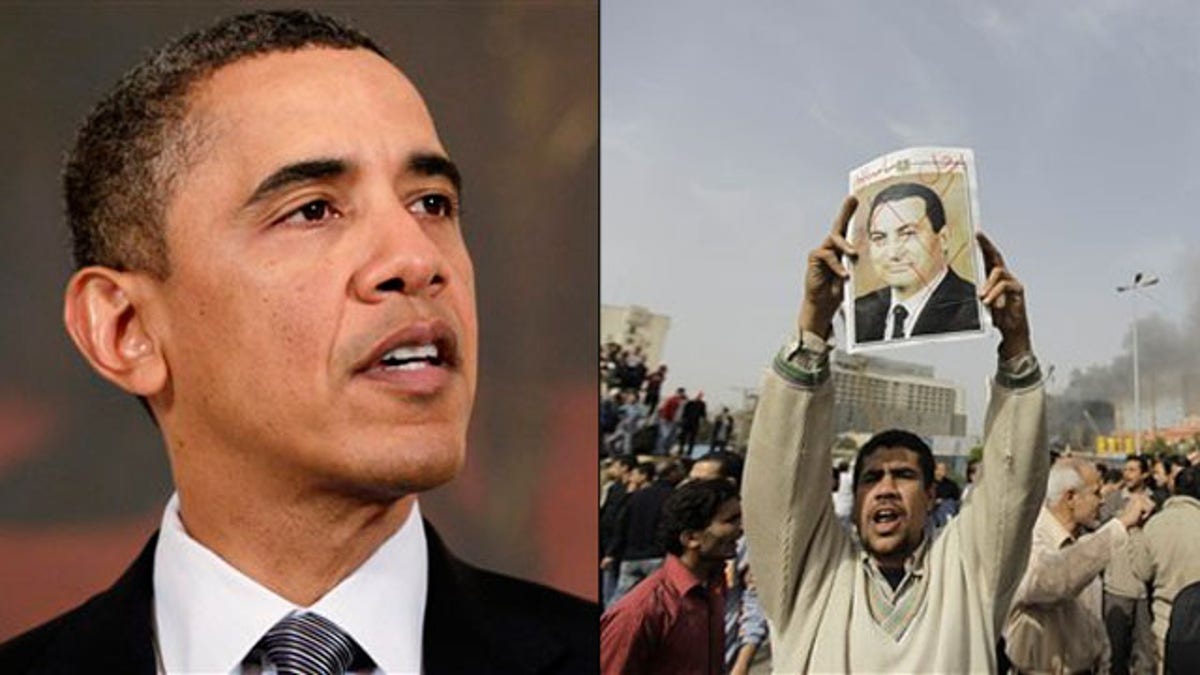
(AP)
As 30-year Egyptian ruler Hosni Mubarak clings to power and protesters continue to storm the streets of Cairo for a fifth straight day, the Obama administration is increasingly looking at a choice between two bad options.
On one side is Mubarak, who has presided over a corrupt government and meager economy without holding free elections and is now paying the price. Unfortunately for President Obama, he's a key U.S. ally and recipient of billions in U.S. military aid.
On the other side is the big unknown. Though many protesters are not taking to the streets armed with religious slogans, analysts warn that the Islamist Muslim Brotherhood -- an outlawed, but significant, opposition group -- could be jockeying to take power if Mubarak falls. And if they do, Egypt's peace with Israel, friendliness toward the West and key role in the Israeli-Palestinian talks could be in jeopardy.
No wonder the White House keeps insisting it's not taking sides.
"We have backed the wrong horse for 50 years," said former CIA officer Michael Scheuer. "To think that the Egyptian people are going to forget that we backed dictators for 50 years, I think is a pipe dream."
President Obama Friday night tried to dial back the tension, announcing that he had spoken personally with Mubarak and told him to take "concrete steps" toward improving the rights and addressing the grievances of the Egyptian people. His remarks reflected a desire for Mubarak to, without using violence, learn from the crisis and parlay the unrest into a reformed political system. Under that scenario, the United States keeps its ally and some semblance of stability, while still siding with the ideals of the protesters.
"Let's be clear what the stakes are for the United States. We've got an authoritarian regime in power that's been our ally. We don't know at this point what the real alternatives are," said John Bolton, former U.S. ambassador to the United Nations under the Bush administration.
But Mubarak's decision Friday to dissolve and recreate his Cabinet failed to mollify the protesters Saturday. Elliott Abrams, a former Middle East adviser to George W. Bush and a current fellow at the Council on Foreign Relations, questioned the effectiveness of that move, noting that the people on the streets are objecting specifically to Mubarak.
"Changing the puppets in that puppet show is not going to have an effect," he told Fox News on Saturday.
He said Obama should be calling publicly for free and fair elections, suggesting that would be a way for the United States to keep a "moderate, centrist type of government" in place. He expressed doubts that in such a scenario, the Muslim Brotherhood would prevail.
"I don't buy the notion that everybody in Egypt is for the Muslim Brotherhood," Abrams said.
But some doubt free elections would follow. Observers count the Muslim Brotherhood -- along with the Egyptian military and former International Atomic Energy Agency head Mohamed ElBaradei, who has returned to Egypt and called on Mubarak to leave -- as viable possibilities for filling the void should Mubarak fall.
Scheuer said that if Mubarak goes down, the Islamists in Egypt are the only ones with the institutions to replace the existing ones.
"I think they have a leg up here," he said.
The Brotherhood is not listed as a terrorist organization by the U.S. State Department, and the Egyptian wing has renounced violence in the past. However, terror groups like Hamas spawned from the decades-old organization and Usama bin Laden deputy Ayman al-Zawahiri used to be a member. It advocates for Islamic law to be applied by the government.
White House Press Secretary Robert Gibbs deflected questions about the Muslim Brotherhood's influence when asked repeatedly about the group at Friday's press briefing.
"I do not think that the grievances of the people of Egypt are of a monolithic political belief," Gibbs said.
If Mubarak stays in power without making critical reforms, the White House made clear Friday that the country's $1.5 billion in military and economic aid would be in jeopardy. That aid has been expanding ever since Egypt made peace with Israel in 1979. According to the State Department, the United States helps support education and other programs, but most importantly the Egyptian military. U.S. assistance has over the years provided Egypt with F-16 fighter jets, Apache helicopters, tanks and other vital equipment.
There are also about 625 U.S. troops in Egypt, according to the Pentagon.




